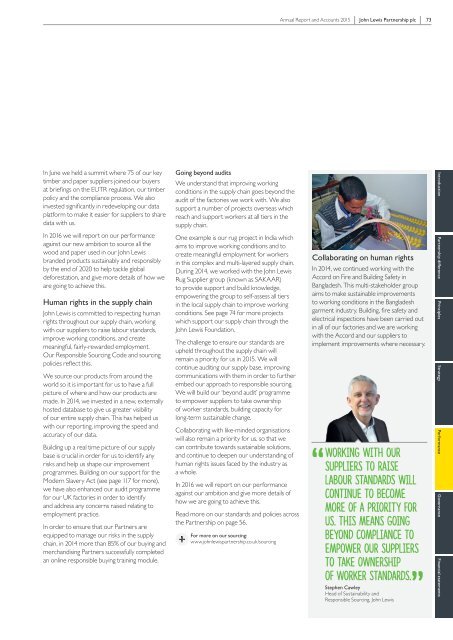john-lewis-partnership-plc-annual-report-2015
john-lewis-partnership-plc-annual-report-2015
john-lewis-partnership-plc-annual-report-2015
You also want an ePaper? Increase the reach of your titles
YUMPU automatically turns print PDFs into web optimized ePapers that Google loves.
Annual Report and Accounts <strong>2015</strong> John Lewis Partnership <strong>plc</strong> 73<br />
In June we held a summit where 75 of our key<br />
timber and paper suppliers joined our buyers<br />
at briefings on the EUTR regulation, our timber<br />
policy and the compliance process. We also<br />
invested significantly in redeveloping our data<br />
platform to make it easier for suppliers to share<br />
data with us.<br />
In 2016 we will <strong>report</strong> on our performance<br />
against our new ambition to source all the<br />
wood and paper used in our John Lewis<br />
branded products sustainably and responsibly<br />
by the end of 2020 to help tackle global<br />
deforestation, and give more details of how we<br />
are going to achieve this.<br />
Human rights in the supply chain<br />
John Lewis is committed to respecting human<br />
rights throughout our supply chain, working<br />
with our suppliers to raise labour standards,<br />
improve working conditions, and create<br />
meaningful, fairly-rewarded employment.<br />
Our Responsible Sourcing Code and sourcing<br />
policies reflect this.<br />
We source our products from around the<br />
world so it is important for us to have a full<br />
picture of where and how our products are<br />
made. In 2014, we invested in a new, externally<br />
hosted database to give us greater visibility<br />
of our entire supply chain. This has helped us<br />
with our <strong>report</strong>ing, improving the speed and<br />
accuracy of our data.<br />
Building up a real time picture of our supply<br />
base is crucial in order for us to identify any<br />
risks and help us shape our improvement<br />
programmes. Building on our support for the<br />
Modern Slavery Act (see page 117 for more),<br />
we have also enhanced our audit programme<br />
for our UK factories in order to identify<br />
and address any concerns raised relating to<br />
employment practice.<br />
In order to ensure that our Partners are<br />
equipped to manage our risks in the supply<br />
chain, in 2014 more than 85% of our buying and<br />
merchandising Partners successfully completed<br />
an online responsible buying training module.<br />
Going beyond audits<br />
We understand that improving working<br />
conditions in the supply chain goes beyond the<br />
audit of the factories we work with. We also<br />
support a number of projects overseas which<br />
reach and support workers at all tiers in the<br />
supply chain.<br />
One example is our rug project in India which<br />
aims to improve working conditions and to<br />
create meaningful employment for workers<br />
in this complex and multi-layered supply chain.<br />
During 2014, we worked with the John Lewis<br />
Rug Supplier group (known as SAKAAR)<br />
to provide support and build knowledge,<br />
empowering the group to self-assess all tiers<br />
in the local supply chain to improve working<br />
conditions. See page 74 for more projects<br />
which support our supply chain through the<br />
John Lewis Foundation.<br />
The challenge to ensure our standards are<br />
upheld throughout the supply chain will<br />
remain a priority for us in <strong>2015</strong>. We will<br />
continue auditing our supply base, improving<br />
communications with them in order to further<br />
embed our approach to responsible sourcing.<br />
We will build our ‘beyond audit’ programme<br />
to empower suppliers to take ownership<br />
of worker standards, building capacity for<br />
long‐term sustainable change.<br />
Collaborating with like-minded organisations<br />
will also remain a priority for us, so that we<br />
can contribute towards sustainable solutions,<br />
and continue to deepen our understanding of<br />
human rights issues faced by the industry as<br />
a whole.<br />
In 2016 we will <strong>report</strong> on our performance<br />
against our ambition and give more details of<br />
how we are going to achieve this.<br />
Read more on our standards and policies across<br />
the Partnership on page 56.<br />
For more on our sourcing:<br />
www.<strong>john</strong><strong>lewis</strong><strong>partnership</strong>.co.uk/sourcing<br />
Collaborating on human rights<br />
In 2014, we continued working with the<br />
Accord on Fire and Building Safety in<br />
Bangladesh. This multi-stakeholder group<br />
aims to make sustainable improvements<br />
to working conditions in the Bangladesh<br />
garment industry. Building, fire safety and<br />
electrical inspections have been carried out<br />
in all of our factories and we are working<br />
with the Accord and our suppliers to<br />
implement improvements where necessary.<br />
WORKING WITH OUR<br />
SUPPLIERS TO RAISE<br />
LABOUR STANDARDS WILL<br />
CONTINUE TO BECOME<br />
MORE OF A PRIORITY FOR<br />
US. THIS MEANS GOING<br />
BEYOND COMPLIANCE TO<br />
EMPOWER OUR SUPPLIERS<br />
TO TAKE OWNERSHIP<br />
OF WORKER STANDARDS.<br />
Stephen Cawley<br />
Head of Sustainability and<br />
Responsible Sourcing, John Lewis<br />
Introduction Partnership difference Principles Strategy Performance Governance Financial statements


